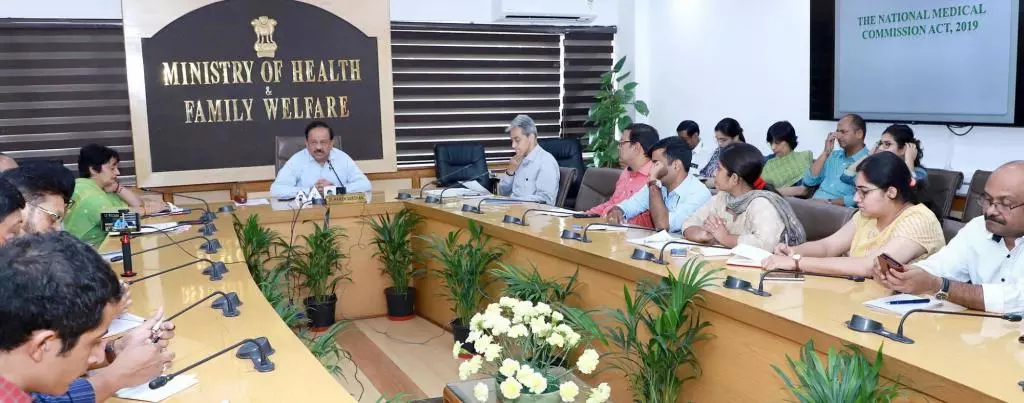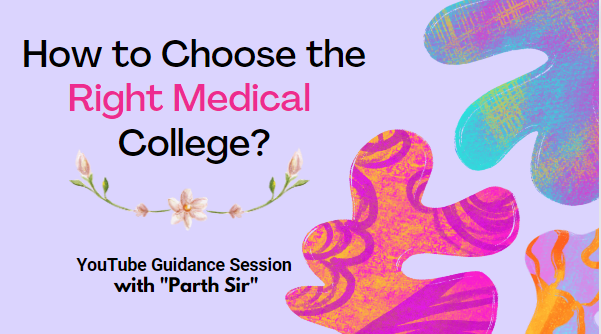NEET Mandatory For Admission To MBBS Courses In AIIMS, JIPMER From 2020 Onwards
From the next academic year 2020-21, a common NEET entrance test for admission to MBBS courses into all medical colleges.
Union Health & Family Welfare Minister Harsh Vardhan has announced that from next academic session, 2020-21, onwards admission to MBBS/BDS courses in medical colleges including all 15 All India Institute of Medical Sciences (AIIMS) in various states and Jawaharlal Institute of Postgraduate Medical Education and Research (JIPMER) in Puducherry, will be through National Eligibility Cum Entrance Test-Under Graduate (NEET-UG).
“Under the new National Medical Commission (NMC) that is in the process of being constituted, there will be no multiple entrance examinations. We are looking at having a single exam, and that includes for AIIMS and other such institutes that offer the undergraduate course. From next year this will start,” said Union Health & Family Welfare Minister.
At present, admissions to all medical colleges except AIIMS and JIPMER are done through NEET exam.
AIIMS and JIPMER Pudducherry, just like any other Institutes of National Importance (INI), are governed by a separate Act of Parliament under which the INI are eligible to conduct their own national-level entrance examination for the courses they provide.
According to Health Ministry officials, a common NEET-UG examination for admission into all medical colleges and also AIIMS, JIPMER, PGI etc. will come into force from the next academic year (2020).
What is NMC Act 2019
On August 8, 2019, President of India gave the nod to the NMC Act 2019. The NMC Act has a provision for setting up of NMC in place of the Medical Council of India (MCI) for the development and regulation of all elements of medical education, profession, and institutions.
Several relevant provisions of the NMC Act came into effect on September 2nd after which the Union Health Ministry on August 9 notified all chief secretaries, home secretaries of UTs and state medical councils inviting nominations for selection of members of the NMC.
“A draw of lots will be held on October 14 for selecting members of the NMC from the nominees of states and UTs and state medical councils,” Dr Harsh Vardhan said.
Increase in number of Medical Seats From Academic Year 2020-21
“The efforts of the Government are to constitute the National Medical Commission (NMC) Act at the earliest so that some of the major reforms can be implemented from the coming academic year 2020-21,” said Dr Harsh Vardhan
With the confirmation provided by the Union Health Minister, AIIMS and JIPMER, which use to hold their own admission process and entrance exam, will now have to adhere and accept NEET scores for admission.
At present 15 AIIMS are operational that offer about 1212 seats including seats for the reserved category students, while JIPMER has approximately 200 undergraduate medical seats.
From the next academic year (2020) four more AIIMS are likely to get operational and accept students at the undergraduate level, which will lead to increase in about 200 more MBBS/BDS seats to the overall AIIMS seats.
Dr Harsh Vardhan said, “The efforts of the Government are to constitute the NMC at the earliest so that some of the major reforms can be implemented from the coming academic session 2020-21.”
He further added, “Efforts are being made to notify fee regulations with effect from the Academic session 2020-21 and advance action on this has already been initiated by the Board of Governers- Medical Council of India (BoG-MCI).”
The union health ministry had notified the rules under Section 56 of the NMC Act, 2019. The NMC will have four distinct autonomous boards, namely Under-Graduate Medical Education Board, Post-Graduate Medical Education Board, Medical Assessment and Rating Board (MARB) and Ethics and Medical Registration Board.
During the course of constituting the NMC, the Healthy Ministry officials said that 23 nominations of Vice-Chancellor and 22 nominations from State Medical Council have been received.
“The Ministry has already invited applications for the posts of Chairperson of the Commission, Presidents and members of four Autonomous Boards, Members and Secretary of the Commission and the last date for submission of the applications is 18th October 2019,” Dr Harsh Vardhan said.
What is NEXT, National Exit Test?
The NMC can conduct a single exam, National Exit Test (NEXT), that will act as the common final year MBBS exam, it will also act as a licentiate exam to practice medicine. NEXT result will be the criteria for admission to postgraduate (PG) medical courses. NEXT will also serve as a screening test for foreign medical graduates intending to study or work in India.
"Once a candidate clears NEXT, he/she can register himself/herself and obtain a licence to practice. The NMC Act does not impose any restriction on the number of attempts at NEXT for improving the rank for admission to PG courses," Dr Harsh Vardhan said.
The NEXT is likely to come into force within three years of NMC being constituted.
Therefore, the NEXT results would serve as the basis for admission to PG course. The medical students will not have to sit in a separate exam for PG entrance.
Indian students who are studying abroad and obtaining foreign medical degrees will have to pass through the same final year exam to get a license.
There will be a distinct board to emphasise on each element of the medical education like development of curriculum, standards of medical education, training of faculty, and facilitation of research.
The medical colleges would be rated by the Medical Assessment and Rating Board (MARB) formed by NMC. It implies that the assessment of the medical colleges will be based on the score of their students in NEXT. The better the students of a particular college would perfrom, the better ranking it will get.
It will encourage medical colleges to improve the quality of education.
“The commission will not only rely on infrastructure and manpower to rate a college but also give weightage to the outcome. It will also reduce dependency on frequent inspections as the Act has done away with yearly registration renewal system. The risk-based assessment will however stay,” said Arun Singhal, additional secretary in the Ministry of Health & Family Welfare.




